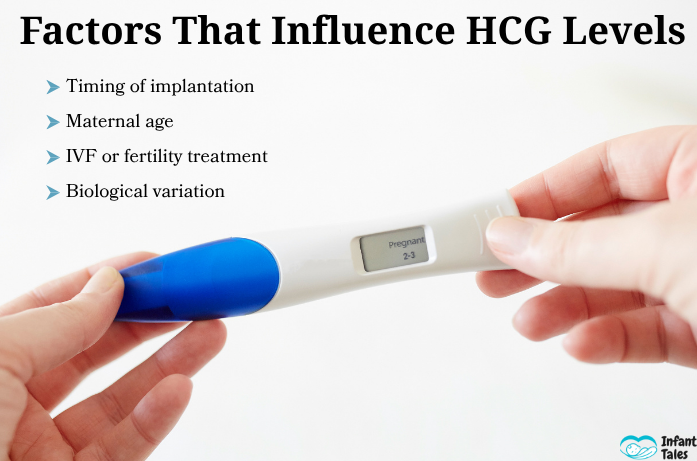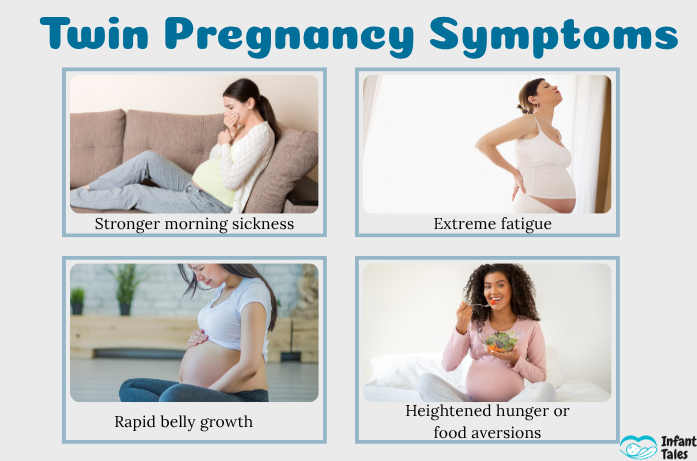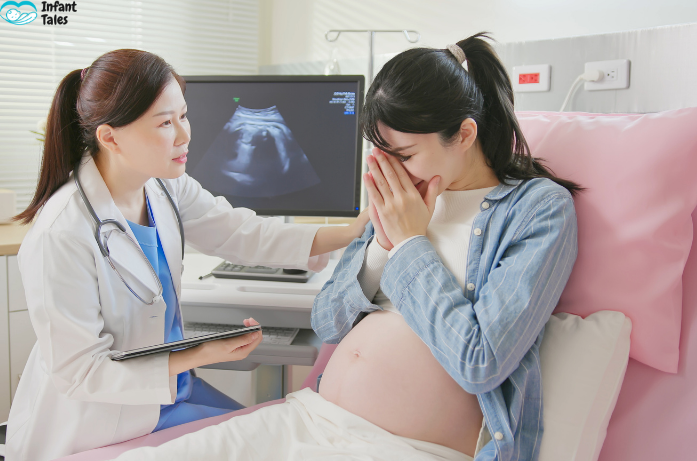By a Caring Mom at Infant Tales
Pregnancy brings countless questions, especially when something unexpected appears in your blood test results. One of the first hormones doctors check in early pregnancy is HCG (Human Chorionic Gonadotropin), and many expecting moms wonder if high HCG levels could mean they’re carrying twins.
Understanding HCG levels in twin pregnancy can help ease anxiety, provide clarity, and guide expectations in those first exciting weeks. Since twin pregnancy HCG levels often differ from single pregnancies, learning what they mean (and what they don’t) is essential. Let’s explore how this pregnancy hormone works, what normal ranges look like, and how pregnancy HCG levels for twins can vary, plus the real signs that may point to multiples.
What Is HCG and Why It Matters
HCG stands for Human Chorionic Gonadotropin, a hormone produced by the placenta shortly after a fertilized egg attaches to the uterine lining. It’s one of the first measurable signs of pregnancy and is responsible for maintaining progesterone, the hormone that supports early fetal growth and keeps the uterine lining thick and healthy.
Your HCG levels rise rapidly in the first trimester, doubling roughly every 48 to 72 hours. This is why doctors often use HCG blood tests to confirm and monitor pregnancy progress.
A positive pregnancy test, whether taken at home or at the doctor’s office, detects this hormone. But what many moms don’t realize is that HCG levels can vary dramatically from one woman to another and even between pregnancies.
For reference, the Mayo Clinic and American Pregnancy Association note that typical HCG levels for a single pregnancy can range widely depending on the week, so there’s no single “normal” number.
Normal HCG Levels in a Single Pregnancy
To understand twin pregnancy HCG levels, it’s important to know what’s typical for a single baby. In a singleton pregnancy, HCG levels roughly follow this pattern:
| Pregnancy Week | Expected HCG Range (mIU/mL) |
| 3 weeks | 5 – 50 |
| 4 weeks | 5 – 426 |
| 5 weeks | 18 – 7,340 |
| 6 weeks | 1,080 – 56,500 |
| 7–8 weeks | 7,650 – 229,000 |
| 9–12 weeks | 25,700 – 288,000 |
These ranges show just how wide the variation can be. Some women with lower HCG levels go on to have healthy pregnancies, while others with high readings may not have twins at all.
HCG Levels in Twin Pregnancy: How They Differ
In a case of expecting twins, the body of the mother obviously secretes extra HCG, which is the pregnancy hormone, since the process of making is going on for two little ones instead of one. Generally, the two babies have their own placentas, and both contribute HCG that is needed for the healthy growth of the baby.
This is the reason why the HCG levels are, in a way, higher than the average. It is quite common for the doctors to detect an increase of this hormone in the blood from one-third to one-half above the levels seen in a single pregnancy, especially during the first few weeks.
For example, if most moms at 4 weeks pregnant have an HCG level around 70, a mom expecting twins might have a level closer to 100 or 120. By 6 weeks, the difference can become more noticeable, but it’s not always double, and every pregnancy is different.
These higher hormone levels sometimes make parents wonder if they might be having twins, especially if early pregnancy symptoms feel stronger. But remember, HCG alone can’t tell for sure. The only way to confirm a twin pregnancy is through an ultrasound, usually around the 6th to 8th week, when two little heartbeats can be seen and heard.
Can High HCG Levels Confirm Twins?
It’s a common myth that high HCG automatically means you’re having twins. While elevated levels are often present in twin or multiple pregnancies, other factors can raise HCG too, such as inaccurate dating of the pregnancy, fertility treatments, or even rare conditions like molar pregnancy.
Doctors rely on serial HCG tests (multiple readings over time) to see how the levels rise, but the only reliable confirmation comes through an ultrasound, typically around the 6th to 8th week of pregnancy.
As Stanford Medicine and ACOG emphasize, the doubling pattern and clinical symptoms give context, not just a single number.

Factors That Influence HCG Levels
HCG can fluctuate widely for reasons unrelated to multiples. Some common influencing factors include:
- Timing of implantation: If your embryo implanted early, levels may appear higher.
- Maternal age: Slight differences occur with age and hormone activity.
- IVF or fertility treatment: Multiple embryo transfers can increase the chance of twins and affect hormone readings.
- Biological variation: Every woman’s body processes hormones differently.
So while high hcg pregnancy levels twins may raise suspicion, they are only one piece of the puzzle.

Difference Between Single and Twin Pregnancy Symptoms
Apart from hormone levels, the difference between single and twin pregnancy symptoms can be noticeable for some moms. Women carrying twins often report:
- Stronger morning sickness: Elevated HCG can trigger more intense nausea.
- Extreme fatigue: Two embryos mean double energy demand.
- Rapid belly growth: A visible twin pregnancy belly may show earlier.
- Heightened hunger or food aversions.
However, symptoms alone aren’t reliable proof, some women with single pregnancies also experience these intensely.
The National Institutes of Health (NIH) notes that individual hormonal sensitivity plays a big role in how each woman feels during early pregnancy.
Twin Pregnancy Belly: When Does It Show?
One of the most exciting visual differences is the twin pregnancy belly. While every body is unique, many moms notice their belly appearing earlier and growing faster than with a single baby.
This is partly due to the increased HCG and progesterone levels, which expand the uterus faster to accommodate two growing babies. Typically, by the end of the first trimester, a twin belly can start to be more pronounced.
Still, belly size alone doesn’t confirm twins, only a scan can verify what’s happening inside.
Medical Monitoring and HCG Testing
Doctors usually perform HCG blood tests in early pregnancy to ensure levels are rising appropriately. For twin pregnancies, they may test more frequently, especially in cases of fertility treatments or previous pregnancy loss.
If your HCG levels rise too quickly or too slowly, your doctor might recommend an ultrasound to rule out potential complications or confirm multiple pregnancy.
The key is not to panic over a single high or low number, your healthcare provider will interpret trends, not isolated results.
The Emotional Side: Excitement and Anxiety
Discovering unusually high twin pregnancy HCG levels can spark both joy and nervousness. It’s completely natural to wonder what lies ahead, from double diaper duty to double cuddles.
While waiting for ultrasound confirmation, try to stay calm and take care of your health. Focus on balanced nutrition, hydration, and rest. And remember, whether you’re carrying one baby or two, your journey is special and uniquely yours.
When to Call Your Doctor
Contact your healthcare provider if you experience:
- Unusual bleeding or cramping
- Severe nausea or dehydration
- Extremely rapid HCG increases or sudden drops
These may or may not indicate a problem, but it’s always best to get medical guidance early. Consistent communication with your doctor helps ensure a safe and informed pregnancy journey.
Key Takeaways for Expectant Parents
- HCG Levels in Twin Pregnancy are typically higher but not double.
- Only an ultrasound can confirm twins, not hormone numbers alone.
- Symptoms like stronger nausea or a fast-growing twin pregnancy belly can accompany high HCG, but they’re not definitive.
- Always follow up abnormal results with your OB-GYN for personalized advice.
- Trust your body, stay patient, and celebrate the miracle growing inside you.
FAQs About HCG Levels in Twin Pregnancy
1. Are HCG levels higher with twins?
Yes, twin pregnancy HCG levels are often 30–50% higher than in single pregnancies because two babies produce more of the hormone.
2. Can high HCG confirm twins?
Not by itself. High HCG pregnancy levels for twins can suggest multiples, but only an ultrasound can confirm twins.
3. When do HCG levels rise in twin pregnancy?
They start increasing soon after implantation and are usually higher than normal between weeks 4 and 6.
4. Do twin pregnancy symptoms feel stronger?
Often yes, moms carrying twins may have stronger morning sickness, fatigue, and faster belly growth.
5. When does a twin pregnancy belly start to show?
A twin pregnancy belly can appear earlier, usually by 8–10 weeks, as the uterus expands faster.
Final Thoughts
Every pregnancy is unique, even more so when it might involve two little heartbeats. HCG Levels in Twin Pregnancy offer helpful clues but never the full story. Use them as a guide, not a diagnosis. Whether it’s a single or twin journey, focus on regular prenatal care, balanced nutrition, and joyful anticipation of meeting your baby (or babies!).
Follow Infant Tales for expert-backed parenting advice, baby care insights, and heartfelt guidance through every stage of your motherhood journey.
Disclaimer: This article on InfantTales.com is for informational purposes only and should not be considered medical advice. Always consult your healthcare provider for personalized guidance regarding pregnancy tests, symptoms, or HCG levels.



